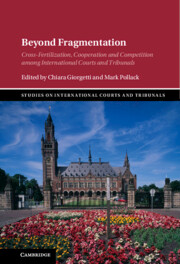 Beyond Fragmentation
Beyond Fragmentation Book contents
- Beyond Fragmentation
- Studies on International Courts and Tribunals
- Beyond Fragmentation
- Copyright page
- Dedication
- Contents
- Contributors
- Foreword
- Preface
- 1 Beyond Fragmentation
- 2 The Procedural Cross-Fertilization Pull
- 3 Procedural Convergence in International Courts and Tribunals
- 4 New Media Evidence across International Courts and Tribunals
- 5 The Acquis Judiciaire, a Tool for Harmonization in a Decentralized System of Litigation?
- 6 Why Cite External Legal Sources?
- 7 Of Gardeners and Bees
- 8 A View from the Coal Face
- 9 Agents of Cross-Fertilization
- Index
3 - Procedural Convergence in International Courts and Tribunals
Published online by Cambridge University Press: 28 April 2022
- Beyond Fragmentation
- Studies on International Courts and Tribunals
- Beyond Fragmentation
- Copyright page
- Dedication
- Contents
- Contributors
- Foreword
- Preface
- 1 Beyond Fragmentation
- 2 The Procedural Cross-Fertilization Pull
- 3 Procedural Convergence in International Courts and Tribunals
- 4 New Media Evidence across International Courts and Tribunals
- 5 The Acquis Judiciaire, a Tool for Harmonization in a Decentralized System of Litigation?
- 6 Why Cite External Legal Sources?
- 7 Of Gardeners and Bees
- 8 A View from the Coal Face
- 9 Agents of Cross-Fertilization
- Index
Summary
No governing international text or generally accepted doctrine defines the procedure to be applied by international courts and tribunals. Yet these institutions’ tasks pose common challenges: providing notice of a dispute, defining its nature and scope, determining the legal rules, marshalling and assessing evidence, finding facts and applying legal rules to them, and then recording and communicating the result. There often is substantial similarity – indeed, convergence – in how courts and tribunals go about these tasks. This chapter examines some of the factors and institutions that contribute to this procedural harmonization among institutions dealing with disputes between parties from different countries and legal cultures. It looks at the shared historical foundations of important procedural practices, the influence of intergovernmental and nongovernmental organizations, the roles individuals sometimes play in transmitting “legal technology” between institutions, and the effect of competition among institutions seeking to meet the needs of their “customers.” It also notes areas where procedure can diverge, as users look for new ways to address procedural problems.
- Type
- Chapter
- Information
- Beyond FragmentationCross-Fertilization, Cooperation and Competition among International Courts and Tribunals, pp. 87 - 112Publisher: Cambridge University PressPrint publication year: 2022
